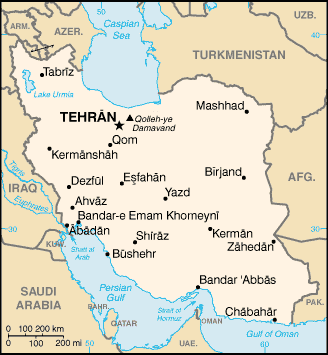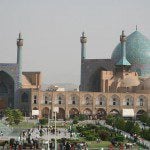
(A publicly-funded effort, publicly available)
But, sadly, this understandable desire to get the attention of the West is frequently joined with an unwillingness on the part of some Near Easterners to take responsibility for the flaws of their own native area. The fact of Western dominance is exaggerated to the point of hallucination. It overwhelms them, much as the absolute sovereignty of God has swallowed up human will in Islamic theology. Many Arabs and other Muslims that I have known seem genuinely to believe that all of the problems in the region are the doing of Western imperialists. (I recall an outbreak of anthrax in southern Iran, some years ago, that the Iranian government blamed upon CIA parachutists dropping in and injecting the cattle.) There is often no sense that anybody in the region has the ability to do anything about the region’s problems, which are seen as depending wholly upon the superpowers and especially upon the United States (coupled with Israel). And this, of course, is a formula for stagnation. The hard truth is that the fate of a people is generally in its own hands. Character, as the pre-Socratic Greek philosopher Heraclitus (ca. 535-475 BC) put it, is destiny. To deny this basic truth means that nobody will lift a finger to do anything, since to do so would be futile. But the first step that must be taken toward regional recovery is the awakening of a sense that the fate of the region is in the hands of the people of that region, very much as the first step in recovery from alcoholism is the recognition that one is, in fact, an alcoholic and that the problem is one’s own. “Indeed,” says Qur’an 13:11, “God will not change the condition of a people until they change what is in themselves.”
I have tried elsewhere to argue against this view that all the problems of the region are the result of superpower meddling, by pointing out that the area must have been flawed to have invited outside intervention in the first place. India, of course, is a case where this is absolutely clear: As I have pointed out, it was only India’s internal weaknesses that allowed the British to move in and take over the subcontinent.
A contrary example is Switzerland during the Second World War. The Swiss were surrounded—by Nazi Germany on the north, occupied Austria on the east, Vichy France on the west, and fascist Italy in the south. The Nazis wanted to seize Switzerland, a Germanic country, and add it to the Third Reich. But they did not. Why? Largely because Switzerland, for all its variety and its ethnic and linguistic divisions, was united. And that unity made the price just too high—higher, anyway, than Hitler and his associates were willing to pay at the time. It is this kind of unity that the Arabs and the Islamic world generally lacked during the time of European colonialism and the period of the Crusades, and that, to a considerable degree, they still lack today. The first Gulf War and continuing tensions between the Shiite and the Sunnis, and between Iran and the Arab states, demonstrate with depressing clarity)
The struggle that today’s Muslims have with the massive fact of the West is well illustrated in contemporary Arabic and other Near Eastern literatures. Several issues constantly appear: How is Western scientific rationalism to be balanced against faith? This is the old issue, faced also in the West itself, of reason versus revelation, of faith versus science. And how are traditional ways to be balanced against innovations? What about dress? What about economic progress? How far should it be allowed to damage the real values of the people? Their uncertainty is well illustrated in the title of a book published in 1964 by the well-known Arab thinker Muhammad Qutb: Are We Still Muslims? it asked.[1]
Do any of these struggles sound familiar? I have argued that we in the West have much to learn in observing these issues and how they are dealt with by Muslims because these are our issues as well. The advantage is that they are more clearly drawn, more starkly apparent, in the Near East. When we are making compromises, we are often not even aware that we are doing so because both our religion and our science, our religious values and the secular values that often threaten them, are clothed in the same language. Things are clearer, in some ways, for the Muslim. The ideas that threaten his traditional values often come clothed in a foreign accent. Ours come in clothes like our own, speaking in a familiar tongue.
I don’t want to give the impression that Islam is faltering across the board. This would be completely, and even dramatically, untrue. Several million Muslims now live in North America, making Islam a larger religion in our own society than several of the religious denominations that we still call “mainstream.” And Islam is spreading rapidly here. It is also growing spectacularly in Africa. There, I suspect, it may serve the same role that it served for the hanifs in early Arabia: It allows people to choose a religion that is not politically involved with any perceived oppressor. To choose Christianity or even secular consumerism is to align oneself with the West, just as to choose communism was to align oneself with what was once considered the other superpower. But Islam is a religion that, for some reason, comes free of the taint of imperialism or aggression. Why this should be so is not precisely clear. After all, the early Arab conquests, though not unusual by ancient standards, were clearly imperialistic by today’s standard. And although Islam’s record on racial matters is considerably better than Christianity’s, Arab Muslims were centrally involved in the African slave trade until surprisingly recent times.[2] Nevertheless, many blacks in the United States—athletes like Muhammad Ali (Cassius Clay) and Kareem Abdul Jabbar (Lew Alcindor)—have opted to reject their “slave-names” and the “slave religion” that went with them, Christianity, and to adopt Islam and Arabic names instead.
Lamin Sanneh, then of Harvard Divinity School, visited Brigham Young University many years ago for a conference on religion in Africa. Prof. Sanneh, a West African Christian who had received an Islamic education, had much to say about the relations between Islam and Christianity in Africa.[3] One of his insights in particular stood out, and I have continued to reflect upon it ever since: Christians, he observed, go out of their way to translate the Bible into every language they can. And when they take its message, they make every effort to strip it of nonessentials. “You do not need to wear Western clothing to be a Christian,” they point out. “Nor do you need to adopt a Western lifestyle or favor Western politics.” They try to fit Christianity into the local culture with the least possible disruption, hoping to minimize the obstacles that will always be there to hinder people from accepting Christ. And these efforts have been very successful. Christianity is growing quite rapidly in parts of Africa, for instance. But Muslims’ efforts to spread their religion have tended to be starkly different. If you want to read the Islamic scripture, they say, you should preferably do it in Arabic. You should pray in Arabic. You should probably adopt an Arabic name. Perhaps, in some areas, you should even begin to dress like an Arab. Islam, in other words, makes little or no effort to fit into the local culture. And — contrary to the wisdom of most Western Christian “missiologists” — Islam is growing more rapidly in Africa than Christianity is.
We’ll have more to say about the situation of contemporary Islam in a subsequent chapter.
[1] His brother, Sayyid Qutb, is even more famous (or notorious) as one of the intellectual founders of modern Islamist “fundamentalism.”
[2] See, on this question, Bernard Lewis’s Race and Slavery in the Middle East: An Historical Inquiry (New York: Oxford University Press, 1990).
[3] A version of Prof. Sanneh’s presentation has been published as Lamin Sanneh, “Translatability in Islam and in Christianity in Africa: A Thematic Approach,” in Religion in Africa: Experience and Expression, edited by Thomas D. Blakely, Walter E. A. van Beek, and Dennis L. Thomson (London: James Currey, and Portsmouth, New Hampshire: Heinemann, 1994), 23-45.












